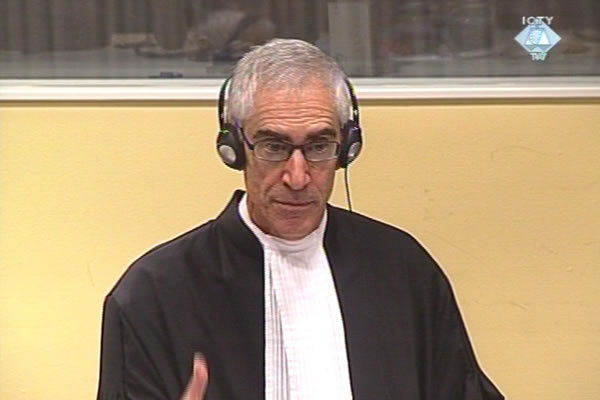Home
PROSECUTION APPEALS AGAINST KARADZIC’S GENOCIDE ACQUITTAL
The prosecution has presented four grounds of appeal against Radovan Karadzic’s acquittal of the charges of genocide in seven municipalities in Bosnia and Herzegovina: Prijedor, Kljuc, Sanski Most, Vlasenica, Foca, Bratunac and Zvornik
 Alan Tieger, prosecutor at the Radovan Karadzic's trial
Alan Tieger, prosecutor at the Radovan Karadzic's trial The prosecution has filed a formal notice of appeal against the judgment acquitting former Republika Srpska president Radovan Karadzic of genocide. The genocide is alleged to have happened in seven BH municipalities in 1992. In four grounds of appeal, the prosecution has asked the Appeals Chamber to reverse the judgment and reinstate Count 1 in the indictment. The Trial Chamber’s errors in law and fact, taken individually or cumulatively, ‘invalidate the judgment’ and represent ‘a miscarriage of justice’
Judge Kwon’s Trial Chamber delivered the controversial judgment on 28 June 2012, pursuant to Rule 98 bis. The rule allows the accused to ask for his acquittal after the end of the prosecution case, if he can argue successfully that the prosecution has failed to present sufficient evidence to support a conviction.
In the opinion of the Trial Chamber, the crimes of murder, inflicting grave physical and mental injuries, detaining in inhumane conditions – that constitute elements of genocide – didn’t ‘in their nature, scope and context’ reach the scale which would indicate ‘beyond reasonable doubt’ that they were committed with an intent to annihilate Bosnian Muslims and Croats as national, ethnic or religious group, in part or in their entirety. In the first ground of appeal, the prosecution contends that the Trial Chamber erred in this conclusion because it applied two additional elements to establish the crime of genocide. According to the prosecution, “applying the rule 98bis standard, a reasonable Trial Chamber could conclude that underlying acts of genocide had occurred”.
The second ground of appeal deals with the genocidal intent of the accused. The prosecution contends that the Trial Chamber failed to establish whether the accused and other members of the joint criminal enterprise had this intent independently from the intent of the direct perpetrators of the crimes. The perpetrators didn’t have to have the intent to commit genocide because the members of the joint criminal enterprise used them as their “tools’, the prosecution claims. The evidence, including the words of the accused that the Bosnian Muslims would ‘disappear, be eliminated, annihilated or exterminated’, are sufficient to support a conclusion that the accused did possess a genocidal intent, the prosecution argues. According to the prosecution, the Trial Chamber failed to provide reasoning that led it to decide there had been no such intent. The judges didn’t evaluate the evidence in its best light, either.
In the third ground of appeal, the prosecution notes that by applying the standard from Rule 98 bis, a reasonable Trial Chamber would be able to conclude that underlying acts of genocide were perpetrated with an intent to destroy the groups in part. The Trial Chamber wanted the annihilation of a ‘part of a group’ be defined as a ‘significant section of the group” and as a ‘substantial number of the members of a group’ without providing any reasoning for its findings. The prosecution also argues that the Trial Chamber erred when it considered each category of acts that constitute elements of genocide individually, rather than in their entirety.
Finally in the fourth ground of appeal, the prosecution claims that the Trial Chamber erred when it failed to correctly analyze whether genocidal intent was established within the framework of other modes of liability – personal and/or command – the accused is charged with.
The deadline for the submission of a detailed appellate brief is 90 days, but the prosecution indicated it would file the brief ahead of the deadline so that the contention issue of genocide could be dealt with before the defense opens its case on 16 October 2012.
Linked Reports
- Case : Karadzic
- 2012-07-10 KARADZIC WANTS TO INTERVIEW CLINTON
- 2012-07-05 KARADZIC WANTS TO APPEAL AGAINST RULE 98 BIS JUDGMENT
- 2012-07-04 KARADZIC WILL NOT TOUR THE REGION
- 2012-07-12 PREPARING THE JUDGES’ CRIME SCENE INVESTIGATION IN SREBRENICA
- 2012-07-17 KARADZIC CALLS BAKIR IZETBEGOVIC AS DEFENSE WITNESS
- 2012-07-18 KARADZIC GRANTED LEAVE TO APPEAL
